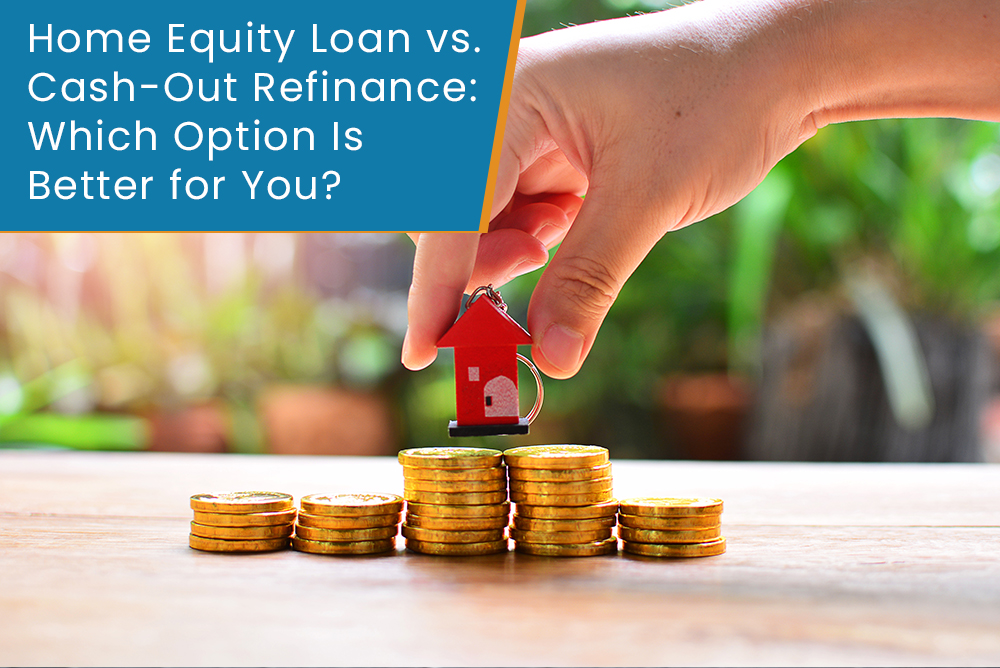
Home Equity Loan vs. Cash-Out Refinance: Which Option Is Better for You?
Tags:
When you need money, look at your home to help you get a loan. Using the equity or appreciation of your home can be a great way to get the cash you need at interest rates that are often better than credit cards or personal loans.
Two types of loans worth considering are home equity loans and cash-out refinancing.
These are excellent tools, and each works best in specific circumstances. This article will define each of these methods, examine the primary differences between them, and assess their pros and cons.
What Is a Home Equity Loan?
First and foremost, we need to define what a home equity loan is. A home equity loan allows homeowners like yourself to borrow against the equity you have built up in your property.
Simply, it means that you can access your home's equity before selling it. The great thing about a home equity loan is that you can use the cash for anything you want. People often use this money for renovations, debt consolidation, or emergency funds.
There is even a chance that the interest paid on your loan is tax-deductible; depending on your specific circumstances, you may be able to write off the interest on the loan if you use the money for home improvements.
Since you're taking out a second mortgage, you should know that the interest rates can be higher than your first mortgage, but that is still not certain.
What is a Cash-Out Refinance?
A cash-out refinance is another way to access the equity built up in your home. In this method, you will replace your existing mortgage with a larger one. By doing this, you're taking out a loan based on your home's increase in value.
However much your home has appreciated, that's the cash you get. Just like a home equity loan, you can use the money you get for anything you like.
You can opt for a fixed or adjustable interest rate when you refinance. This choice can allow you to have some say in what your mortgage looks like. Refinancing your home can offer lower interest rates than other borrowing options, such as personal loans or credit cards.
Since you have increased your mortgage, you should be mindful that your monthly payments will increase.
Primary Differences
The primary and noticeable difference between a home equity loan and a cash-out refinance is what happens to your first primary mortgage. With a home equity loan, your first mortgage remains unchanged. With a cash-out refinance, you can get a new mortgage and reap certain benefits, such as extending the repayment term.
The closing costs of a home equity loan are typically lower than cash-out refinancing. As we mentioned, the interest on your home equity loan might be tax-deductible.
Experts state that a home equity loan is better for specific and minor expenses.
Cash-out refinancing typically comes with lower interest rates than a home equity loan. As well, this method can be better for getting more money. Of course, this depends on several factors, such as the equity you have in your home and interest rates.
Pros and Cons
Benefits of Cash-Out Refinancing
As mentioned, cash-out refinancing often comes with lower interest rates than home equity loans. In addition, because your home has likely increased in value, cash-out refinancing typically allows you to access a more considerable amount of money.
Potential Drawbacks of Cash-Out Refinancing
If you extend the term of your new mortgage, you risk paying more interest over the loan's lifetime. Furthermore, because cash-out refinancing allows you to access more money doesn't mean you necessarily need that money, and you can overborrow.
Finally, your interest rate may change over time if you opt for an adjustable-rate mortgage. You may not be interested in taking on that risk, depending on your goals and needs.
Benefits of Home Equity Loans
Home equity loans usually have a fixed interest rate, which lets you know exactly how much your monthly payments are. Also, because it is a loan separate from your existing mortgage, it does not affect the terms of your first mortgage.
We have already mentioned the potential tax benefits and the lower closing costs compared to a cash-out refinance.
Potential Drawbacks of Home Equity Loans
Since you are taking out a second mortgage on your home, that loan will usually have a higher interest rate than your first mortgage.
Also, the amount of money you can borrow is determined by the amount of equity you own in your home. You should consider why you need the money and if you own enough equity to consider a home equity loan.
Which is Better For You?
Of course, there's much to consider when deciding between a home equity loan and a cash-out refinance. It can take time to determine the correct path forward. You must look critically at your financial situation, goals, and needs. In this article, we have outlined a few considerations for this decision.
Consider how much money you need, what kind of repayment you can, and if you want to make any changes to your first mortgage. There is much more to consider, and you should seek a professional's advice.
Getting sound and trustworthy advice is always recommended. We are a friendly team of licensed professionals who genuinely want to help you find the best loan. We are confident in our service and are proud to offer 24-hour approvals and even a free personal consultation to get you started.
For more information about home equity loans and cash-out refinancing, call Canadalend at 1-844-586-0713 or contact us here.